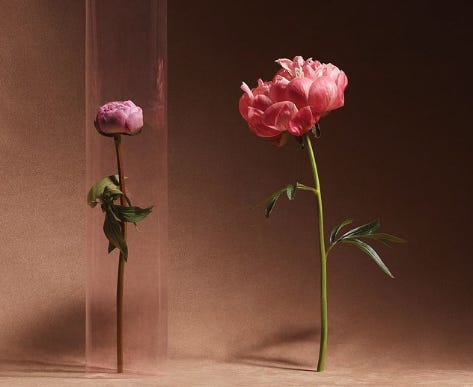Antidotes for a life that's never good enough
Frameworks for enoughness and an unexpected revelation
If you enjoy this newsletter: would you mind sharing it with three achievers in your life? Thank you for your support 🙏
In the last post, we explored two sides of meritocracy. We have more agency over our individual success than our ancestors did, which makes achievement both more possible and higher stakes than ever in history.
On one hand, we’re more capable than ever of building a big life. On the other hand, with the world as our oyster, we’re never quite doing enough with our lives.
“X enough” milestones
What is enough?
At the heart of this question is defining what’s required of good life. Naturally, this topic has been the fixation of philosophers, writers, artists, business leaders, and perhaps every human being who has walked the planet, looked up at the night sky, and wondered about the meaning of it all.
We experience an immense quantity of joy and struggle in our lives. It would be too heartbreaking to accept that this roller coaster ride is meaningless. Without a clear answer, we attach meaning to tangible milestones. They give us a direction to sail towards, so we can avoid the uncomfortable feeling of being adrift. Once I get that promotion or title, I will have achieved enough. Once I have $X amount of money in the bank, I will have made enough. Once I find the love of my life, I will be happy enough.
Deep down, we know that these concrete depictions of enoughness won’t be wholly satisfying. "All my career, I’ve wanted to make partner,” shared one high achiever I interviewed. “Now that I am a partner [at my firm], it doesn’t feel like I thought it would. What’s my next goal? What’s the next mountain to climb?”
“X enough” milestones give us a sense of direction, but they don’t fix our internal compasses. We get to the destination and realize it might not have been the right one for us after all.
Frameworks for enoughness
How does one hone their internal compass?
If you’re like me, you’ll find it insufficient to adopt any single framework as the end-all-be-all answer.
One approach is to start collecting. Ask questions, read, listen, have conversations— and jot down the ideas that resonate for you, as if you’re cutting out favorite sayings and images from a magazine and assembling a unique collage for an “enough” life.
Here are three ideas to get you started, more to come in future posts:
Eudaimonia
Rewind to ancient Greece. A philosopher named Plato devoted his life to helping people find eudaimonia, defined as happiness, fulfillment, and human flourishing (ironic, as my high school philosophy teacher pointed out, for a word pronounced you-die-moan-ia). Through personal growth— examining our lives, clarifying our minds, seeking truth and excellence— we fulfill our human potential. “An unexamined life is not worth living,” said Plato’s teacher Socrates. It’s the process of growth itself, not the material outcomes, that make a life virtuous.
Maximizers vs. satisficers
Psychologist Barry Schwartz studied two types of decision makers. Maximizers want the very best. They like to have complete information about the costs and benefits of each option. They make thorough comparisons before making an optimal choice and fear missing out on a better option.
Satisficers define their bar for “good enough” and are happy to put aside lengthy vetting to settle for whatever option meets their bar. While maximizers achieve higher salaries than satisficers (perhaps they’re less satisfied and more willing to negotiate, satisficers are on average happier and experience less regret than maximizers.
Maximizers struggle in our world of near infinite options. As they achieve more, their choices broaden, expectations rise, and FOBO (fear of the better option) settles in:
As people have contact with items of high quality, they begin to suffer from “the curse of discernment.” The lower quality items that used to be perfectly acceptable are no longer good enough. The hedonic zero point keeps rising, and expectations and aspirations rise with it. As a result, the rising quality of experience is met with rising expectations, and people are just running in place. As long as expectations keep pace with realizations, people may live better, but they won’t feel better about how they live.
As the saying goes, enough is a choice, not a feeling or amount.
Low expectations
There’s a popular formula for happiness: Happiness = Reality / Expectations. When we get all worked up about the Instagrammable lives we want to live, happiness inevitably plummets because our realities simply cannot catch up to the sky-high vision we set our sights on.
William James, philosopher and psychologist of the nineteenth century, argued that disappointment is most often caused by having pretenses that exceed our real world successes. No point staking your reputation and pride on achieving something great. Lower your expectations, and you’ll be rewarded with higher self esteem.
An unexpected revelation
The Moth is a non-profit organization that creates community and healing through storytelling. Before the pandemic, I was an avid attendee of The Moth’s events in New York City.
Over a hundred people huddled in a dimly lit downtown bookstore, squeezed themselves into metal folding chairs and lined the staircases, cash-bought cans of beer and popcorn in hand, to hear brave strangers share personal stories in five minutes or less.
How a Moth story slam works: Upon entering, anyone can put their name into a hat. In doing so, they opt in to telling a story related to the event’s theme, which ranges from love to embarrassment to luck.
Throughout the night, ten people are chosen at random to step onto the stage, adjust the microphone to their height, and grace an audience of New Yorkers with their tale.
The story is judged by audience members based on how real, compelling, and well-delivered it is. Hearts are filled; tears are shed; laughter is shared. When the storyteller stumbles or stutters inelegantly, everyone cheers them on because we know that sharing personal truths with a room of strangers takes the utmost courage and vulnerability.
In 2019, a man told a story about his relationship with his late father. The last line took my breath away (note: I’m paraphrasing and likely butchering it because the story itself is now a wisp of a memory).
“From my father, I learned that the meaning of life could be distilled into four things: to love, to be loved, to create, and to appreciate beauty and wonder.”
That’s exactly it, I thought. That’s the purpose.
To gut check the integrity of this framework, I flipped through my mental archive of what gives life meaning. Nope, I couldn’t think of anything worth living for beyond those four things. The framework was so whole and complete that I immediately jotted it down on my iPhone.
Since then, this framework has been my antidote when striving for “enough.” When I feel like I’m not enough, like my life or achievements are not enough, I anchor myself in the last line of the story.
I ask: Do I have enough of these things in my life? Am I present enough to notice and fully experience them?
The answer to the first question is nearly always “yes, in great abundance.” The answer to the second question is usually “no, I take them for granted.”
Overlooking enoughness
To love and be loved
"If only you could sense how important you are to the lives of those you meet; how important you can be to people you may never even dream of. There is something of yourself that you leave at every meeting with another person." — Fred Rogers
It’s easy to take love for granted. John and Julie Gottman, two social psychologists who run the Love Lab, researched the daily interactions of hundreds of couples. They collected hundreds of hours of tapes and analyzed what factors cause romantic partnerships to stay in tact or fall apart years later.
They discovered that partners will make “bids” for love and connection. A bid can be as simple as asking “how did your day go?” or “did you see what happened to so-and-so?” They can appear in the form of seemingly mundane observations or small talk. “That’s an interesting color for a car.” “Isn’t that bird cool looking?”
The Gottmans refer to bids as “the fundamental [units] of emotional communication.” They are deceptively small gestures, tempting to ignore with a grunt or shrug.
And yet, they form the foundation of love. The most successful partnerships engaged with each other’s bids 86% of the time, whereas strained partnerships only did so 33% of the time.
Bids happen beyond our romantic relationships, even during the pandemic. A friend who texts you to say happy birthday, a moment of vulnerability on social media— these are all bids for love and connection, if only we could recognize them as such and turn towards each other.
To create
The Sacred Design Lab describes beautifully the notion of “becoming,” which the organization defines as “growing into the people we are called to be:”
We each carry gifts the world needs. Yet too many of us face barriers to tending our inner gifts, sharing them in community, and bountifully receiving the gifts of others.
As humans, we want very badly to shape authentic meaning for ourselves, for our communities, and for the world around us. Deep down, we desire the ability to infuse our truest selves into a thing and see it realized in the world. We want to solve interesting problems, express our gifts, and witness their impacts on others.
It’s unfortunate, then, that our teachers and upbringers tend to refuse the natural creativity we’re born with. “All children are born artists,” said Pablo Picasso. “The problem is to remain an artist as we grow up.”
Kevin Ashton shares in How to Fly a Horse:
People who are more creative also tend to be more playful, unconventional, and unpredictable, and all of this makes them harder to control. No matter how much we say we value creation, deep down, most of us value control more. And so we fear change and favor familiarity. Rejecting is a reflex.
As a result, many of us felt more creative when we were toddlers than we do now as adults— despite significant advancement in our cognitive faculties and resources. When we encounter a creative spark in the shower or on a pleasant walk, our “best judgment” beats us down. As adults we are quite skilled at rationalizing why we shouldn’t create the thing we most want to manifest. We extinguish the flame and return to our pragmatic responsibilities.
Last year, I participated in a creative leadership program that asked me to draw a map of all the reasons why I resist creating things I’m excited about. What an intricate web of excuses explaining why I can’t and shouldn’t be creative, even though I have more than enough skills and tools available to me.
To appreciate beauty and wonder
Take refuge in your senses, open up
To all the small miracles you rushed through.
—John O'Donohue
Growing up, I loved the arts. Before I knew what “flow state” meant, I was always in it: playing music, composing, painting, writing. In fact, I got in trouble for being too in flow: daydreaming and writing poetry in third grade math class instead of working on fractions.
As a child, I inherently knew that I was participating in something bigger than myself: an expansive and wondrous world.
But I wasn’t taught to appreciate beauty for its own sake. When we visited the Smithsonian growing up, my parents would admire the artist’s craftsmanship, their hard work and dedication.
“Look how realistically they represented that scene!” they’d say. “The brush strokes are expertly done.” My art and music lessons were focused on technique. Do it the right way. Acquire a talent that you can show others. Learn the value of discipline. Art had a specific and earthly purpose.
It wasn’t until I was much older that I discovered transcendence through art. I meandered into the jazz scene in New York City, a heady cocktail of improvisation and expression. In 2018 and 2019, I’d spend four or five nights out of the week at jazz spots, mesmerized by the spontaneity and harmony, my personal awakening to wonder.
Much of our stress and anxiety is caused by a belief that we are big and separate from others, that everything in our lives is very big, and that as a result, what happens to us is incredibly high stakes.
A recent neuroscience study suggests that recounting spiritual experiences can reduce stimulation in a part of the brain associated with self-reference. In other words, when we experience transcendence and awe— whether through religion, the arts, or nature— we put aside fixation about who we are and who we should be, and surrender to the fact that we are simply are in a much larger system.
During the pandemic, reading, being in nature, and visiting galleries have been my favorite past times for no good reason other than to appreciate the wonder that exists out there, without any effort or striving needed on my part.
——
The Moth storyteller gifted me a bittersweet irony. Seeking enoughness in status, career, or wealth requires trading off the things that actually enable me to feel enough. Taking stock of what matters gives me perspective. I have enough, and more.
Reflection #04: What does enough mean to you? What are some antidotes to the feeling of “not enough” in your life?








